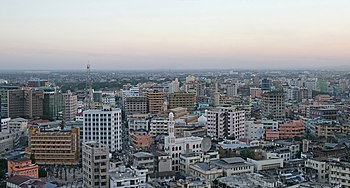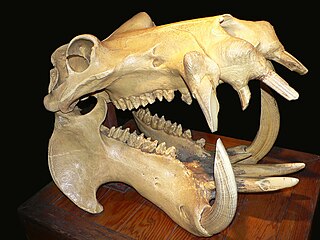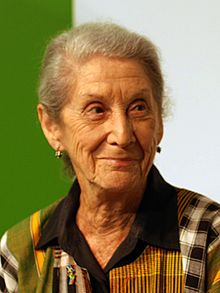Portal:Africa



Africa is the world's second-largest and second-most populous continent after Asia. At about 30.3 million km2 (11.7 million square miles) including adjacent islands, it covers 20% of Earth's land area and 6% of its total surface area. With nearly 1.4 billion people as of 2021, it accounts for about 18% of the world's human population. Africa's population is the youngest among all the continents; the median age in 2012 was 19.7, when the worldwide median age was 30.4. Despite a wide range of natural resources, Africa is the least wealthy continent per capita and second-least wealthy by total wealth, ahead of Oceania. Scholars have attributed this to different factors including geography, climate, corruption, colonialism, the Cold War, and neocolonialism. Despite this low concentration of wealth, recent economic expansion and a large and young population make Africa an important economic market in the broader global context. Africa has a large quantity of natural resources and food resources, including diamonds, sugar, salt, gold, iron, cobalt, uranium, copper, bauxite, silver, petroleum, natural gas, cocoa beans, and.
Africa straddles the equator and the prime meridian. It is the only continent to stretch from the northern temperate to the southern temperate zones. The majority of the continent and its countries are in the Northern Hemisphere, with a substantial portion and a number of countries in the Southern Hemisphere. Most of the continent lies in the tropics, except for a large part of Western Sahara, Algeria, Libya and Egypt, the northern tip of Mauritania, and the entire territories of Morocco, Ceuta, Melilla, and Tunisia, which in turn are located above the tropic of Cancer, in the northern temperate zone. In the other extreme of the continent, southern Namibia, southern Botswana, great parts of South Africa, the entire territories of Lesotho and Eswatini and the southern tips of Mozambique and Madagascar are located below the tropic of Capricorn, in the southern temperate zone.
Africa is highly biodiverse; it is the continent with the largest number of megafauna species, as it was least affected by the extinction of the Pleistocene megafauna. However, Africa also is heavily affected by a wide range of environmental issues, including desertification, deforestation, water scarcity, and pollution. These entrenched environmental concerns are expected to worsen as climate change impacts Africa. The UN Intergovernmental Panel on Climate Change has identified Africa as the continent most vulnerable to climate change.
The history of Africa is long, complex, and varied, and has often been under-appreciated by the global historical community. In African societies, the historical process is largely a communal one, with eyewitness accounts, hearsay, reminiscences, and occasionally visions, dreams, and hallucinations, crafted into oral traditions, leading some to term them oral civilisations. Truth is generally viewed as relativist. Africa, particularly Eastern Africa, is widely accepted to be the place of origin of humans and the Hominidae clade, also known as the great apes. The earliest hominids and their ancestors have been dated to around 7 million years ago, including Sahelanthropus, Australopithecus africanus, A. afarensis, Homo erectus, H. habilis and H. ergaster, the earliest Homo sapiens (modern human) remains, found in Ethiopia, South Africa, and Morocco, date to circa 233,000, 259,000, and 300,000 years ago, respectively, and Homo sapiens is believed to have originated in Africa around 350,000–260,000 years ago. Africa is also considered by anthropologists to be the most genetically diverse continent as a result of being the longest inhabited. (Full article...)
Selected article –
The Amphitheatre of El Jem (Arabic: قصر الجم, romanized: Qaṣr al-Jamm) is an oval amphitheatre in the modern-day city of El Djem, Tunisia, formerly Thysdrus in the Roman province of Africa. It is listed by UNESCO since 1979 as a World Heritage Site. (Full article...)
Featured pictures –
Did you know (auto-generated) -

- ... that The Anglo-African was the first newspaper to be published in the British Colony of Lagos?
- ... that although it was only formed in late 1939, the French 87th African Infantry Division inflicted 6,600 casualties upon the German forces and fought until the very end of the Battle of France?
- ... that James A. Merriman was the only Black graduate from Rush Medical College in 1902 and the first African-American physician to practice medicine in Portland?
- ... that Ruth L. Bennett provided shelter for more than 2,000 black women and girls who migrated north to Chester, Pennsylvania, as part of the Great Migration?
- ... that the Bethel African Methodist Episcopal Church in Springtown, New Jersey, was used by Harriet Tubman to help fugitive slaves escape?
- ... that William H. Davis was the first teacher of Booker T. Washington and the first African American to be nominated as a candidate for West Virginia governor in 1888?
Categories
Selected biography –
Nadine Gordimer (20 November 1923 – 13 July 2014) was a South African writer and political activist. She received the Nobel Prize in Literature in 1991, recognised as a writer "who through her magnificent epic writing has ... been of very great benefit to humanity".
Gordimer was one of the most honored female writers of her generation. She received the Booker Prize for The Conservationist, and the Central News Agency Literary Award for The Conservationist, Burger's Daughter and July's People. (Full article...)
Selected country –
 |
 |
||

| |||
Malawi, officially the Republic of Malawi (formerly Nyasaland), is a country in southeastern Africa. It borders Zambia to the north-west, Tanzania to the north, and Mozambique to the east, south, and west.
The Great Rift Valley runs through the country from north to south. In this deep trough lies Lake Malawi (also called Lake Nyasa), the third-largest lake in Africa, and the tenth largest in the world, constituting about 20% of Malawi's area. East and west of the Rift Valley are high plateaus, generally between 900 and 1,200 m (3,000–4,000 ft) above sea level. The Nyika Uplands rise as high as 2,600 m (8,500 ft) in the north and south of the lake lie the Shire Highlands, with an elevation of 600–1,600 m (2,000–5,000 ft).
Malawi is one of Sub-Saharan Africa's most densely populated countries. Lilongwe, Malawi's capital since 1971, has a population of more than 400,000. Blantyre remains Malawi's major commercial center and largest city, having grown from an estimated 109,000 inhabitants in 1966 to nearly 500,000 in 1998. (Read more...)
Selected city –

Giza (/ˈɡiːzə/; sometimes spelled Gizah, Gizeh, Geeza, Jiza; Arabic: الجيزة, romanized: al-Jīzah, pronounced [ald͡ʒiːzah], Egyptian Arabic: الجيزة el-Gīza [elˈgiːzæ]) is the third-largest city in Egypt by area after Cairo and Alexandria; and fourth-largest city in Africa by population after Kinshasa, Lagos, and Cairo. It is the capital of Giza Governorate with a total population of 4,872,448 in the 2017 census. It is located on the west bank of the Nile opposite central Cairo, and is a part of the Greater Cairo metropolis. Giza lies less than 30 km (18.64 mi) north of Memphis (Men-nefer, today the village of Mit Rahina), which was the capital city of the unified Egyptian state during the reign of pharaoh Narmer, roughly 3100 BC.
Giza is most famous as the location of the Giza Plateau, the site of some of the most impressive ancient monuments in the world, including a complex of ancient Egyptian royal mortuary and sacred structures, among which are the Great Sphinx, the Great Pyramid of Giza, and a number of other large pyramids and temples. Giza has always been a focal point in Egypt's history due to its location close to Memphis, the ancient pharaonic capital of the Old Kingdom. (Full article...)
In the news
- 12 February 2024 –
- Two boats collide on the Congo River near Kinshasa, Democratic Republic of the Congo; with the death toll remains unclear. (AP)
- 11 February 2024 – 2023 Africa Cup of Nations
- In association football, hosts Ivory Coast win their third Africa Cup of Nations by defeating Nigeria 2–1 in the final. Sébastien Haller scores the winning goal in the 81st minute. (The Guardian)
- 10 February 2024 – Somali civil war
- Four Emirati soldiers and a Bahraini military officer are killed, while ten other people are injured, when a soldier opens fire at a military base in Mogadishu, Somalia, before being killed in the ensuing shootout. Al-Shabaab claims responsibility. (AP)
- 10 February 2024 –
- A Eurocopter EC130 helicopter crashes near Nipton, California, United States, killing all the six people on board, including Nigerian banker Herbert Wigwe. (CBS News)
- 10 February 2024 – 2023–2024 Senegalese protests
- Violent protests occur in Senegal following an announcement by President Macky Sall that presidential elections have been delayed from February 25 to December 15. (Sky News)
- 9 February 2024 –
- At least 18 people are killed during a collision between a bus and a truck on a road in Kinshasa, Democratic Republic of the Congo. (AP)
Updated: 16:33, 14 February 2024
General images -
Africa topics
More did you know –
- ... that at approximately 5,000 years old, the Lothagam North Pillar Site is thought to be the earliest and largest monumental cemetery in eastern Africa?
- ... that a 2020 study found that African countries which allowed foreign funding of NGOs had a higher voter turnout?
- ... that Essop Moosa, who was of Indian origin, became the first non-white player to play for an all-white soccer team in South Africa, appearing under a pseudonym?
- ... that the Seventh German Inner Africa Research Expedition served as cover for a secret First World War espionage mission?
Related portals
Major Religions in Africa
North Africa
West Africa
Central Africa
East Africa
Southern Africa
Associated Wikimedia
The following Wikimedia Foundation sister projects provide more on this subject:
-
Commons
Free media repository -
Wikibooks
Free textbooks and manuals -
Wikidata
Free knowledge base -
Wikinews
Free-content news -
Wikiquote
Collection of quotations -
Wikisource
Free-content library -
Wikispecies
Directory of species -
Wikiversity
Free learning tools -
Wikivoyage
Free travel guide -
Wiktionary
Dictionary and thesaurus

























































































